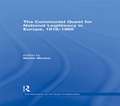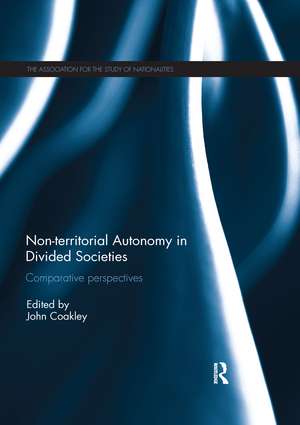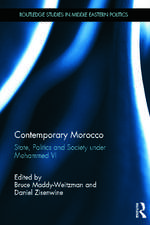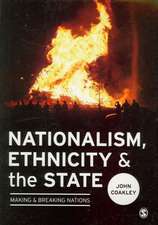Non-territorial Autonomy in Divided Societies: Comparative Perspectives: Association for the Study of Nationalities
Editat de John Coakleyen Limba Engleză Paperback – 30 iun 2020
This book was published as a special issue of Ethnopolitics.
| Toate formatele și edițiile | Preț | Express |
|---|---|---|
| Paperback (1) | 257.94 lei 6-8 săpt. | |
| Taylor & Francis – 30 iun 2020 | 257.94 lei 6-8 săpt. | |
| Hardback (1) | 764.20 lei 6-8 săpt. | |
| Taylor & Francis – 7 feb 2017 | 764.20 lei 6-8 săpt. |
Din seria Association for the Study of Nationalities
- 20%
 Preț: 184.81 lei
Preț: 184.81 lei - 16%
 Preț: 299.52 lei
Preț: 299.52 lei - 20%
 Preț: 184.81 lei
Preț: 184.81 lei - 20%
 Preț: 184.81 lei
Preț: 184.81 lei - 20%
 Preț: 184.81 lei
Preț: 184.81 lei - 16%
 Preț: 299.52 lei
Preț: 299.52 lei - 17%
 Preț: 183.96 lei
Preț: 183.96 lei - 17%
 Preț: 295.74 lei
Preț: 295.74 lei - 28%
 Preț: 820.73 lei
Preț: 820.73 lei - 17%
 Preț: 255.86 lei
Preț: 255.86 lei - 23%
 Preț: 187.49 lei
Preț: 187.49 lei -
 Preț: 407.01 lei
Preț: 407.01 lei - 22%
 Preț: 190.88 lei
Preț: 190.88 lei - 28%
 Preț: 496.53 lei
Preț: 496.53 lei - 28%
 Preț: 523.55 lei
Preț: 523.55 lei - 15%
 Preț: 297.62 lei
Preț: 297.62 lei - 16%
 Preț: 312.43 lei
Preț: 312.43 lei - 17%
 Preț: 294.43 lei
Preț: 294.43 lei - 21%
 Preț: 267.77 lei
Preț: 267.77 lei - 21%
 Preț: 268.59 lei
Preț: 268.59 lei -
 Preț: 319.70 lei
Preț: 319.70 lei
Preț: 257.94 lei
Preț vechi: 325.43 lei
-21% Nou
Puncte Express: 387
Preț estimativ în valută:
49.36€ • 53.60$ • 41.46£
49.36€ • 53.60$ • 41.46£
Carte tipărită la comandă
Livrare economică 22 aprilie-06 mai
Preluare comenzi: 021 569.72.76
Specificații
ISBN-13: 9780367595418
ISBN-10: 0367595419
Pagini: 200
Dimensiuni: 174 x 246 mm
Greutate: 0.35 kg
Ediția:1
Editura: Taylor & Francis
Colecția Routledge
Seria Association for the Study of Nationalities
Locul publicării:Oxford, United Kingdom
ISBN-10: 0367595419
Pagini: 200
Dimensiuni: 174 x 246 mm
Greutate: 0.35 kg
Ediția:1
Editura: Taylor & Francis
Colecția Routledge
Seria Association for the Study of Nationalities
Locul publicării:Oxford, United Kingdom
Notă biografică
John Coakley is Professor of Politics at Queen’s University Belfast, Northern Ireland, and Professor Emeritus at University College Dublin, Ireland
Cuprins
1. Introduction: non-territorial minorities and the notion of cultural autonomy (John Coakley, Queen’s University Belfast) 2. The Jewish question and national cultural autonomy in Europe (Roni Gechtman, Mount Saint Vincent University) 3. The Ottoman empire: the millet system (Karen Barkey, Columbia University) 4. Moravia: an early experiment in non-territorial autonomy (Börries Kuzmany, Central European University, Budapest) 5. Estonia: a model for interwar Europe? (David J Smith, University of Glasgow) 6. Belgium: non-territorial and territorial devolution (Emmanuel Dalle Mulle, University of Geneva) 7. Canada: First Nations in a federal state (Bettina Petersohn, University of Edinburgh) 8. The Sami: indigenous autonomy in Scandinavia (Per Selle, University of Bergen) 9. The Maori quest for autonomy in New Zealand (Richard Hill, Victoria University, Wellington) 10. Conclusion: patterns of non-territorial autonomy (John Coakley, Queen’s University Belfast)
Recenzii
'Non-territorial Autonomy in Divided Societies can be taken as a first step in the study of non-territorial forms of autonomy and may therefore serve as an extensive introduction for academics who are approaching a new field of research: it poses questions and draws methods of evaluation; it brings back to the front an unfairly neglected field of research; and, finally, it lays the groundwork for a much-needed revival of the topic.'
Mattia Zaba, School of International Studies of the University of Trento
Mattia Zaba, School of International Studies of the University of Trento
Descriere
This book explores, from a comparative perspective, the role of non-territorial autonomy in managing ethnic conflict in divided societies where groups are territorially interspersed. As well as examining the roots and institutional features of this form of government, it explores the public policy implications of this formula.
Th
Th









